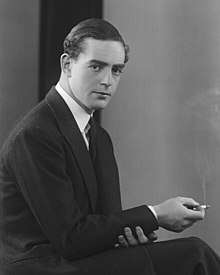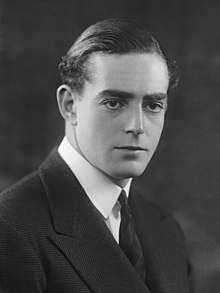Charles Greville, 7th Earl of Warwick
Charles Guy Fulke Greville, 7th Earl of Warwick, 7th Earl Brooke (4 March 1911 – 20 January 1984), was a British peer and the last Earl of Warwick to live at the family seat Warwick Castle before its sale in 1978. He became the first British aristocrat to star in a Hollywood movie, and was later nicknamed the Duke of Hollywood by the local press.
The Earl of Warwick | |
|---|---|
 The Earl of Warwick in 1933 | |
| Personal details | |
| Born | Charles Guy Fulke Greville 4 April 1911 London, England |
| Died | 20 January 1984 (aged 72) Rome, Italy |
| Political party | Conservative |
| Spouse(s) | Rose Bingham
( m. 1933; div. 1938)Mary Kathleen Hopkinson
( m. 1942; div. 1949)Janine Josephine Detry de Mares
( m. 1963) |
| Relations | Anthony Eden (uncle) John Eden (cousin) Nicholas Eden (cousin) |
| Children | David Greville, 8th Earl of Warwick |
| Parents | Leopold Greville, 6th Earl of Warwick Elfrida Marjorie Eden |
| Residence | Warwick Castle |
| Alma mater | Eton College |
| Nickname(s) | The Duke of Hollywood |
Early life
%2C_by_John_Singer_Sargent.jpg)
Charles Guy Fulke Greville was born at 13a Lower Grosvenor Place West, London on 4 March 1911.[1] He was the eldest son of Leopold Greville, 6th Earl of Warwick (1882–1928) and his wife Elfrida Marjorie Eden (1887–1943), the only daughter of Sir William Eden, 7th Baronet.[2] "Fulkie", as he was known to intimates, had two younger brothers, Hon. Richard Francis Maynard Greville, a Governor of University College Hospital, and Hon. John Ambrose Henry Greville, who was killed in action in 1942 during World War II.[3]
His paternal grandparents were Francis Greville, 5th Earl of Warwick and his wife, Daisy Greville, Countess of Warwick. His grandmother Daisy inherited the Maynard estates in 1865 from her grandfather, Henry Maynard, 3rd Viscount Maynard, and reportedly was a long-term mistress to the Prince of Wales, who later became King Edward VII.[3]
Fulkie was educated at Eton and at Chillon College, Lake Geneva in Switzerland.[4] He succeeded to the earldom at the age of 16 in January 1928,[5] on the death of his father (who had only become the 6th Earl four years earlier in 1924).[6] He joined the Grenadier Guards after completing his education.
Career

Acting career
In the 1920s and 1930s, many British actors found work in the American film industry; Sheridan Morley called this the "Hollywood Raj".[7] In 1936, Charles Greville became the first British aristocrat to be offered a Hollywood contract by MGM. He was to receive £200 a year, and the services of a valet and secretary.
Newspaper reports at the time suggested his reasoning for taking a film contract was sex motivated. He referred to his wages as his own "pocket money" and that he was 'simply seeking a job like everyone else'. He used the stage name Michael Brooke to distance himself from his aristocratic background.[1] After six months he was dropped by MGM resulting in a long court battle thereafter.
As the highest-profile Englishman in Hollywood, Charles became a celebrity figure with nicknames like 'The Duke of Hollywood' and 'Warwick the Filmmaker' (a pun on Warwick the Kingmaker). Listed with a string of high-profile affairs including Greta Garbo, Marlene Dietrich and Paulette Goddard, he was famed for socialising within celebrity circles.
In 1938, he was offered another chance at acting through Paramount. He finally got his chance to star in a movie and was given a lead role in The Dawn Patrol alongside David Niven and Errol Flynn. This would be his only mainstream movie however, and he was subsequently dropped thereafter.[8]
The Earl of Warwick
Following his failure in America, and with the start of World War II, Warwick returned to the United Kingdom. Coventry, near his family seat, suffered tremendous aerial bombing, and he opened his home to evacuees from the city, as well as to the Ministry of Supplies. It was rumoured that Nazi war criminal Rudolf Hess was held at Warwick Castle for one night while being transported from Scotland to London.[9][10]
He was Mayor of Warwick between 1951 and 1952, organising great celebrations for the success of the boxer Randolph Turpin, and although not then Mayor hosted King George VI and Queen Elizabeth at Warwick Castle when they visited Warwick and Leamington in 1951.
Warwick was a Conservative member of the House of Lords; his political actions included opposing certain agricultural measures successfully. He supported his uncle Anthony Eden who succeeded Winston Churchill in the 1950s.
Later life
In 1955, Charles Greville bought homes in Switzerland, Italy, and France and begin travelling between all three. In 1957, he funded and established the illustrious Eagle Ski Club in Gstaad, Switzerland, becoming its first honorary President.[11][12]
Throughout the next decade, Charles, widely described as one Britain's richest men, began to sell many of the family possessions, including estates in Warwick, heirlooms, and much of the armour collection at Warwick Castle. In 1969, he left England altogether to avoid British income taxes, moving to Rome.[13]
In 1967, he handed over control of his family estate to his son David Greville, Lord Brooke.[14] His son sold Warwick Castle to Madame Tussauds in 1978, causing a public confrontation between father and son.[13]
Personal life
Lord Warwick was married three times. He was also engaged to Margaret Whigham, later Duchess of Argyll, but the engagement was broken off in March 1932.[4] His first marriage took place on 11 July 1933 to his second cousin, Rose Bingham, daughter of David Cecil Bingham (a granddaughter of the 5th Earl of Rosslyn and Gen. Sir Cecil Bingham and a descendant of the 4th Earl of Lucan).[15] Before their 1938 divorce, Charles and Rose were the parents of one son:[16]
- David Robin Francis Guy Greville, 8th Earl of Warwick (1934–1996),[13] who married Sarah Anne Chester Beatty, daughter of Alfred Chester Beatty (the "King of Copper"), in 1956.[17] They divorced in 1967 and she married Harry Thomson Jones.[3]
After their divorce, Rose married three more times before her death in 1972. Lord Warwick's second marriage took place on 19 February 1942 to Mary Kathleen (née Hopkinson) Bell.[18] Mary, the former wife of Harold Edward Bell, was the eldest daughter of Percy Clifford Hopkinson of Seabarn in Kingston Gorse. In 1947, he pleaded guilty to "cashing two checks at Cannes, France, thus receiving francs for pounds in violation of British Treasury regulations" and was fined £1,150.[19] They divorced in 1949.[3]
Lord Warwick married thirdly in November 1963 to Janine Josephine Detry de Mares, a daughter of Georges Detry de Mares.[3]
Upon the death of Lord Warwick in Rome on 20 January 1984, David Greville, 8th Earl of Warwick, his only son by his first wife, inherited his titles. He was buried at St. Mary's Church, Warwick.[3]
References
- Kilburn, Matthew (2014). "Greville, (Charles Guy) Fulke [performing name Michael Brooke], seventh earl of Warwick and seventh Earl Brooke (1911–1984), socialite and actor". Oxford Dictionary of National Biography. doi:10.1093/ref:odnb/106964.
- "LORD BROOKE MARRIED.; Future Earl of Warwick Weds Daughter of Sir William Eden" (PDF). The New York Times. 30 April 1909. Retrieved 26 November 2019.
- "Warwick, Earl of (GB, 1759)". www.cracroftspeerage.co.uk. Heraldic Media Limited. Retrieved 26 November 2019.
- TIMES, Wireless to THE NEW YORK (3 March 1932). "EARL OF WARWICK REPORTED ENGAGED; Betrothed to Miss Margaret Whigham, Last-Year Debutante, London Paper Says. PLIGHTED TROTH IN EGYPT Returning Now With a Touring Party--Earl, 21 Tomorrow, Is in Grenadier Guards" (PDF). The New York Times. Retrieved 26 November 2019.
- "EARL OF WARWICK, NOTED SOLDIER, DIES; Wounded While Commanding Canadian Brigade in France --Won Several Honors. RAN AWAY AT 17 TO ENLIST Fought in Boer War--Aide to Kitchener, French and Milner-- Presented Pershing to King" (PDF). The New York Times. 1 February 1928. Retrieved 26 November 2019.
- "NEW EARL OF WARWICK.; As Fighter and Writer He Has Seen Three Wars, Though Only 41" (PDF). The New York Times. 21 January 1924. Retrieved 26 November 2019.
- Sheridan Morley (1983) The Brits in Hollywood: Tales from the Hollywood Raj. UK: Weidenfeld & Nicolson. ISBN 0-297-78289-4, also published as Tales From The Hollywood Raj: The British, the Movies, and Tinseltown. New York: Viking, 1983, ISBN 0-670-69162-3.
- Cull, Nicholas John (1996). Selling War: The British Propaganda Campaign Against American "neutrality" in World War II. Oxford University Press. p. 51. ISBN 978-0-19-511150-7. Retrieved 26 November 2019.
- "Warwick - Memorabilia UK". www.memorabilia-uk.co.uk. Retrieved 26 November 2019.
- Pickup, Gilly (2019). The 50 Greatest Castles and Palaces of the World. Icon Books. p. 60. ISBN 978-1-78578-458-3. Retrieved 26 November 2019.
- Greenberg, Al (October 1974). "Europe's Most Elegant: Zurs, Cortina, Megeve, and Gstaad have reputations that attract the very rich. Do they know something we should?..." Skiing. 27 (2): 200. Retrieved 26 November 2019.
- Theodoracopulos, Taki (24 December 2015). "What Happened to Gstaad?". The American Conservative. Retrieved 26 November 2019.
- Thomas Jr, Robert Mcg (24 January 1996). "Earl of Warwick, 61, Who Sold His Castle to Madame Tussauds". The New York Times. Retrieved 26 November 2019.
- Hand, Stuart (7 May 2017). "Warwick Castle". Retrieved 26 November 2019.
- "EARL OF WARWICK WEDS HIS COUSIN Village Church at Glynde, Sussex, Is Scene of Marriage to Rose Bingham" (PDF). The New York Times. 12 July 1933. Retrieved 26 November 2019.
- "WARWICK WINS DIVORCE; Earl's Suit Is Uncontested--He Gains Custody of Their Son" (PDF). The New York Times. 15 February 1938. Retrieved 26 November 2019.
- "SARAH BEATTY FIANCEE; Engaged to Lord Brooke, Son of the Earl of Warwick" (PDF). The New York Times. 28 June 1956. Retrieved 26 November 2019.
- "EARL OF WARWICK WEDS; Ex-Actor, Nephew of Anthony Eden, Marries Mrs. M. K. Bell" (PDF). The New York Times. 20 February 1942. Retrieved 26 November 2019.
- "Earl of Warwick Is Fined £1,150" (PDF). The New York Times. 18 July 1947. Retrieved 26 November 2019.
External links
| Wikimedia Commons has media related to Charles Greville, 7th Earl of Warwick. |
- Hansard 1803–2005: contributions in Parliament by the Earl of Warwick
- Michael Brooke on IMDb
| Peerage of Great Britain | ||
|---|---|---|
| Preceded by Leopold Guy Francis Maynard Greville |
Earl of Warwick 1928–1984 |
Succeeded by David Robin Francis Guy Greville |